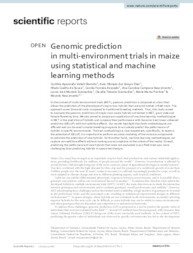Genomic prediction in multi-environment trials in maize using statistical and machine learning methods.
Genomic prediction in multi-environment trials in maize using statistical and machine learning methods.
Autoria: BARRETO, C. A. V.; DIAS, K. O. das G.; SOUSA, I. C. de; AZEVEDO, C. F.; NASCIMENTO, A. C. C.; GUIMARAES, L. J. M.; GUIMARÃES, C. T.; PASTINA, M. M.; NASCIMENTO, M.
Resumo: In the context of multi-environment trials (MET), genomic prediction is proposed as a tool that allows the prediction of the phenotype of single cross hybrids that were not tested in field trials. This approach saves time and costs compared to traditional breeding methods. Thus, this study aimed to evaluate the genomic prediction of single cross maize hybrids not tested in MET, grain yield and female flowering time. We also aimed to propose an application of machine learning methodologies in MET in the prediction of hybrids and compare their performance with Genomic best linear unbiased prediction (GBLUP) with non-additive effects. Our results highlight that both methodologies are efficient and can be used in maize breeding programs to accurately predict the performance of hybrids in specific environments. The best methodology is case-dependent, specifically, to explore the potential of GBLUP, it is important to perform accurate modeling of the variance components to optimize the prediction of new hybrids. On the other hand, machine learning methodologies can capture non-additive effects without making any assumptions at the outset of the model. Overall, predicting the performance of new hybrids that were not evaluated in any field trials was more challenging than predicting hybrids in sparse test designs.
Ano de publicação: 2024
Tipo de publicação: Artigo de periódico
Unidade: Embrapa Milho e Sorgo
Palavras-chave: Hibrido, Milho, Predição genômica, Produtividade
Observações
1 - Por padrão são exibidas publicações dos últimos 20 anos. Para encontrar publicações mais antigas, configure o filtro ano de publicação, colocando o ano a partir do qual você deseja encontrar publicações. O filtro está na coluna da esquerda na busca acima.
2 - Para ler algumas publicações da Embrapa (apenas as que estão em formato ePub), é necessário ter, no celular ou computador, um desses softwares gratuitos. Sistemas Android: Google Play Livros; IOS: iBooks; Windows e Linux: software Calibre.
Acesse outras publicações
Acesse a Base de Dados da Pesquisa Agropecuária (BDPA) para consultar o acervo completo das bibliotecas da Embrapa.

